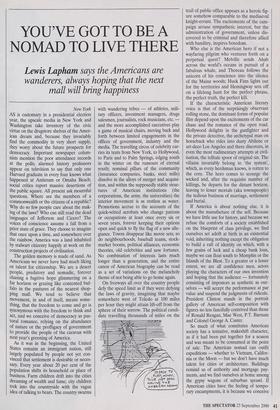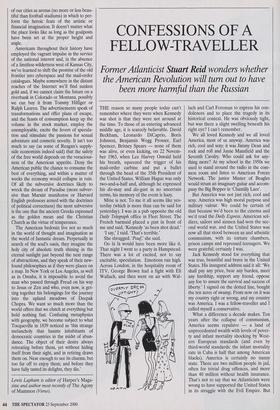YOU'VE GOT TO BE A NOMAD TO LIVE THERE
Lewis Lapham says the Americans are
wanderers, always hoping that the next mall will bring happiness
New York AS is customary in a presidential election year, the upscale media in New York and Washington take inventory of the civic virtue on the drugstore shelves of the Amer- ican dream and, because they invariably find the commodity in very short supply, they worry about the future prospects for democracy. Important newspaper colum- nists mention the poor attendance records at the polls; alarmed history professors appear on television to say that only one Harvard graduate in every four knows what happened at Antietam or Omaha Beach; social critics report massive desertions of the public square. All present ask mournful questions. Where are the members of a commonwealth or the citizens of a republic? Why do so few people care about the mak- ing of the laws? Who can still read the dead languages of Jefferson and Cicero? The voices of conscience assume a fall from a prior state of grace. They choose to imagine that once upon a time, and somewhere over the rainbow, America was a land inhabited by stalwart citizenry happily at work on the construction projects of civilisation.
The golden memory is made of sand. As Americans we never have had much liking or talent for citizenship. We are a desert people, predatory and nomadic, forever chasing a fugitive hope glimmering on a far horizon or grazing like contented buf- falo in the pastures of the nearest shop- ping mall. We tend to believe that movement, in and of itself, means some- thing, that the freedom to come and go is synonymous with the freedom to think and act, and we conceive of democracy as pas- toral romance, relying on the abundance of nature or the profligacy of government to provide the people of the caravan with next year's greening of America.
As it was in the beginning, the United States remains an immigrant nation, still largely populated by people not yet con- vinced that settlement is desirable or neces- sary. Every year about 20 per cent of the population shifts its household or place of business. Farm children drift into the cities dreaming of wealth and fame; city children trek into the countryside with the vague idea of talking to bears. The country swarms with wandering tribes — of athletes, mili- tary officers, investment managers, drugs salesmen, journalists, rock musicians, etc. and the more accomplished executives play a game of musical chairs, moving back and forth between limited engagements in the offices of government, industry and the media. The travelling circus of celebrity car- ries its tents from New York, to Hollywood, to Paris and to Palm Springs, edging south in the winter on the rumours of eternal youth; nominal pillars of the community (insurance companies, banks, steel mills) dissolve in the alloys of merger and acquisi- tion, and within the supposedly stable struc- tures of American institutions (the corporations, the army, the universities) the interior movement is as restless as water. Promotions accrue to the accounts of the quick-witted acrobats who change patrons or occupations at least once every six or seven years, forever keeping their options open and quick to fly the flag of a new alle- giance. Towns disappear like movie sets; so do neighbourhoods, baseball teams, stock- market booms, political alliances, economic theories, old celebrities and new fortunes. No combination of interests lasts much longer than a generation, and the entire canon of American biography can be read as a set of variations on the melancholy theme of not being able to go home again.
On freeways all over the country people defy the speed limit as if they were defying the laws of gravity, imagining that maybe somewhere west of Toledo at 100 miles per hour they might attain lift-off from the sphere of their sorrow. The political candi- date travelling thousands of miles on the trail of public office appears as a heroic fig- ure somehow comparable to the mediaeval knight-errant. The excitements of the cam- paign arouse sympathetic interest, but the administration of government, unless dis- covered to be criminal and therefore allied with banditry, inspires boredom.
Who else is the American hero if not a wayfaring pilgrim who ventures forth on a perpetual quest? Melville sends Ahab across the world's oceans in pursuit of a fabulous whale, and Thoreau follows the unicorn of his conscience into the silence of the Maine woods; Huck Finn lights out for the territories and Hemingway sets off on a lifelong hunt for the perfect phrase, the perfect truth, the perfect kill.
If the characteristic American literary voice is that of the surprisingly observant rolling stone, the dominant forms of popular film depend upon the excitements of the car chase and the romance of the open road. Hollywood delights in the gunfighter and the private detective, the archetypal man on horseback who rides into dusty Abilene or art-deco Los Angeles and there discovers, in even the most rudimentary attempts at civil- isation, the telltale spoor of original sin. The villains invariably belong to 'the system', which, as every herdsman knows, is rotten to the core. The hero comes to scourge the wicked and, after the requisite number of killings, he departs for the distant horizon, leaving to lesser mortals (aka townspeople) the tedious business of marriage, settlement and burial.
If America is about nothing else, it is about the manufacture of the self. Because we have little use for history, and because we refuse the comforts of a society established on the blueprint of class privilege, we find ourselves set adrift at birth in an existential void, inheriting nothing except the obligation to build a raft of identity on which, with a few grains of luck and a cheap bank loan, maybe we can float south to Memphis or the Islands of the Blest. To a greater or a lesser extent, we are all confidence men, actors playing the characters of our own invention and hoping that the audience — fortunately consisting of impostors as synthetic as our- selves — will accept the performance at par value and suspend the judgments of ridicule. President Clinton stands in the portrait gallery of American self-composition with figures no less fancifully contrived than those of Ronald Reagan, Mae West, P.T. Barnum and Colonel George A. Custer.
So much of what constitutes American society has a tentative, makeshift character, as if it had been put together for a season and was meant to be consumed at the point of sale. The American nomad can outfit expeditions — whether to Vietnam, Califor- nia or the Moon — but we don't have much talent for cities or architecture. Buildings remind us of authority and mortgage pay- ments, and we find ourselves at home among the gypsy wagons of suburban sprawl. If American cities have the feeling of tempo- rary encampments, it is because we conceive of our cities as arenas (no more or less beau- tiful than football stadiums) in which to per- form the heroic feats of the artistic or financial imagination. It doesn't matter what the place looks like as long as the goalposts have been set at the proper height and angle.
Americans throughout their history have employed the vagrant impulse in the service of the national interest and, in the absence of a limitless wilderness west of Kansas City, we've learned to shift the promise of the old frontier into cyberspace and the mail-order catalogues. Maybe somewhere in the distant reaches of the Internet we'll find sunken gold and, if we cannot claim the future on a riverbank in Colorado or Montana, possibly we can buy it from Tommy Hilfiger or Ralph Lauren. The advertisements speak of transformations and offer plans of escape, and the feasts of consumption keep up the volume in the stock market, employ the unemployable, excite the fevers of specula- tion and stimulate the passions for sexual adventure and cosmetic novelty. It isn't too much to say (as some of Reagan's supply- side economists indeed said) that the safety of the free world depends on the voracious- ness of the American appetite. Deny the American public the chance to consume the best of everything, and within a matter of weeks the economy would collapse in ruin. Of all the subversive doctrines likely to wreck the dream of Paradise (more subver- sive than Marxist manifestos or Harvard English professors armed with the doctrines of political correctness) the most subversive is the one that the ancient Greeks expressed as the golden mean and the Christian Church as the virtue of temperance.
The American bedouin live not so much in the world of thought and imagination as the world of fantastic dream. Perpetually in search of the soul's oasis, they imagine the holy city of absolute truth shining in the eternal sunlight just beyond the next range of abstractions, and they speak of their new- found philosophies as if they were places on a map. In New York or Los Angeles, as well as in Omaha, it is impossible to avoid the man who passed through Freud on his way to Jesus or Zen and who, even now, is get- ting together his belongings for the journey into the upland meadows of Deepak Chopra. We want so much more than the world offers that we clutch at everything but hold nothing fast. Confusing metaphysics with geography, we become subject to what Tocqueville in 1839 noticed as `this strange melancholy that haunts inhabitants of democratic countries in the midst of abun- dance. The object of their desire always retreating before them, yet without hiding itself from their sight, and in retiring draws them on. Near enough to see its charms, but too far off to enjoy them; and before they have fully tasted its delights, they die.'
Lewis Lapham is editor of Harper's Maga- zine and author most recently of The Agony of Mammon (Verso).























































































 Previous page
Previous page